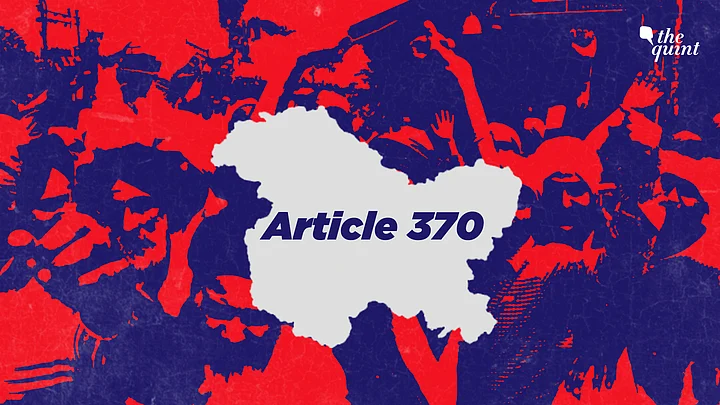(This is a personal blog. The views expressed are the author’s own. The Quint neither endorses nor is responsible for them.)
Impunity is a long-standing bane for Jammu and Kashmir. The lack of political will to elicit accountability for past and present actions of the government and the security forces is fortified and aggravated by another obstacle to justice; especially for those who lack financial resources or education.
The climate of impunity encourages violations and it also alienates people and their faith in the government and justice.
While growing up in a Sikh family in Jammu and Kashmir and seeing the suffering of family members who are affected by the violence, I felt tormented and scared as a child with a psychological fear of facing backlash. But, I decided that I shall refuse to be intimidated and refuse to be forced to silence. I started to work on the Human Rights issue because I do not want our next generation to witness what I did in my days.
Kashmir Misses Vajpayee
The BJP stalwart Atal Bihari Vajpayee won many hearts in Kashmir when he used the famous the triad of Insaniyat, Jamhooriyat and Kashmiriyat for addressing the Kashmir issue. His people-first approach made the confidence of Kashmiris rest on his shoulders. However, contrary to the late unafraid leader Vajpayee, the current government’s approach towards Kashmir is based on muscle power and heavy crackdown.
Had it been Vajpayee, he would have called for an all-party meeting to invite suggestions from the Opposition, too . But long gone is that era of democratic discussion. The current dispensation, instead of discussing it with the regional players, has decided to arrest the local representatives of the Kashmiri people.
Kashmiris are living under the draconian laws like AFSPA, PSA or be it the use of Pump-action shotguns firing metal pellets and so forth, it is no different than living in a war zone. And if all of this was not enough, the undemocratic move towards the abrogation of Article 370 is no less sprinkling salt on the old wounds.
Does the abrogation of Article 370 mean that the residents of J&K are out on a sale?
Article 370 Abrogation Makes Promises Without a Plan
There has been much debate regarding the constitutionality of Article 370 where many say it’s a temporary article. In Sampat Prakash Vs State of Jammu and Kashmir (1969), the Supreme Court refused to accept Article 370 as temporary. A five-judge Bench said, “Article 370 has never ceased to be operative”. Thus, it is a permanent provision.
The reason for the abrogation of Article 370 is not hued in the shades of integration, rather to appease the majority population of the country. Perhaps, it is the sole pre-poll promise they could live up to in the post-election phase. The economy of the country is routing on a vulnerable path, the auto industry will sink any day in a more profound fashion than Titanic and entrepreneurs are being drifted on the cusp of suicide. Unemployment is rising at a nimble-footed pace, yet the powers in New Delhi promised jobs, investment and sustainable future for the residents of Jammu and Kashmir. But, when inquired on how the Government plans to pursue their claims, all that lands at our shore is silence and confusion.
Does the abrogation of Article 370 mean that the residents of J&K are out on a sale? The Government of India and various other states are complicit in this objectification of its citizens and promotion of profanity, their silence is no less than tacit approval.
One Way Communication with Kashmiris
The residents of Kashmir are under a lockdown for almost two weeks now, with little to no communication with the rest of the world. I spoke to my family members on 10 August but there are many who still shed tears of fraught for their incapacity to contact their families. The two erstwhile Chief Ministers were arrested while Farooq Abdullah is placed under the house arrest. Could we find any shades of democracy in these measures?
In the past two weeks, I was compelled to deactivate most of my social media accounts particularly because of the hate messages and memes volleyed at my shore for expressing my thoughts. Patriarchy, misogyny, racism and toxic masculinity are thriving on social media under the garb of muscular nationalism.
Suddenly everyone thinks that they can get their hands on Kashmiri women. Morphed photos of Kashmiri women are circulating on the internet with a full display of profanity, yet no action.
The New Normal in Kashmir
Shall we accept this crackdown and communication restrictions as our new normal? I am confused, what does Government mean when they say everything is normal in Kashmir?
It’s the duty of any democratically elected government to take all stakeholders into consideration before making any decisions. There is nothing called autocratic democracy. Dialogue is the only way forward in any democracy.
From the Chittisinghpora massacre to Kunan Poshpora, nothing has changed in the Valley. Much water has flowed through the Jhelum River in these intervening years. If Jhelum could speak, she would testify for the thousands of the unidentified bodies that have flowed through it in anonymity. The screams of people still echo in those lanes where the inhuman butcheries were perpetrated.
It's a pity that some people will not hesitate to bake their bread on the burning pyre of emotions.
(Sanam Sutirath Wazir is a human rights activist, and has been working as a researcher with the victims of the 1984 Sikh massacre since 2013.)
(At The Quint, we question everything. Play an active role in shaping our journalism by becoming a member today.)
